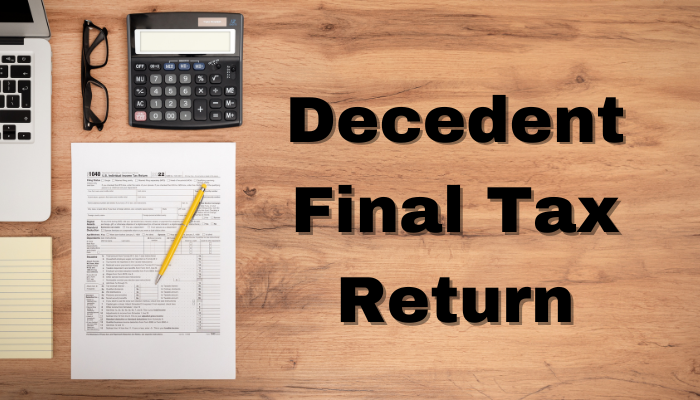
Decedent Final Tax Return
During the complex and emotional time that follows the death of a loved one, one of the practical issues that needs to be taken care of is taxes. One of the essential reports to settle somebody’s bequest when they wither away is their last expense form, frequently known as the decedent final tax return.
Our best tax consultant Houston covers all the relevant essentials and helpful tips to aid you through managing the decedent final tax return.
An Insight into Final Tax Return of the Decedent
The final tax return submitted on behalf of a deceased person is the decedent’s final tax return. It extends from the start of the tax year until the day of their passing. The decedent’s entire income up to the time of death is included in this return, along with any credits and deductions for which they are qualified.
Documentation Needs
The filing requirements for a decedent’s final tax return are comparable to those for individual tax returns. The correct tax documents for the predetermined fiscal year should be utilized to record the return. It’s urgent that the decedent’s last expense form should be recorded by a similar threshold as individual assessment forms, typically April 15 of the following year. When submitting the final return, having these papers on hand will guarantee correctness and completeness.
Agent’s Responsibility
The agent of the departed’s domain is usually accountable for presenting the decedent final tax return. The executor is responsible for gathering the necessary information, completing the tax return, and submitting it on time and correctly. Furthermore, the agent could require a business recognizable proof number (EIN) for the bequest to document the return.
Rejections and Considerations for Money
It’s essential to uncover all pay the departed accurately gets until’ the very end while presenting the decedent’s last assessment form. This covers all types of income, like profits, interest, wages, pay rates, and rental pay. Certain earnings, including disaster protection installments to a recipient or certain retirement plan payouts, couldn’t be remembered for the last report.
Credits and Deductions
Deductions and credits can lower the tax obligation on the decedent’s final tax return, just like they can on individual tax filings. Expenses for burial, medical care, and any unpaid debts of the deceased are typical deductions. Furthermore, if the dead fulfills the requirements, credits like the earned income tax credit or child tax credit can be eligible.
The Bottom Line
One of the most crucial steps in winding up a deceased person’s affairs is filing the decedent final tax return. It is possible to guarantee that the final return is submitted appropriately and by tax rules by being aware of the procedures and requirements involved. While going through this procedure may seem overwhelming, getting help from our tax advisor services and estate lawyers may offer priceless advice and support during this difficult time.


